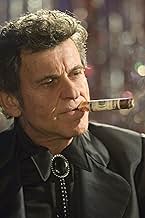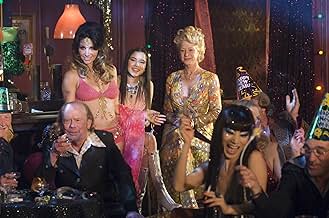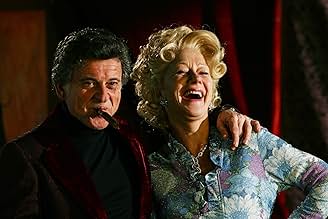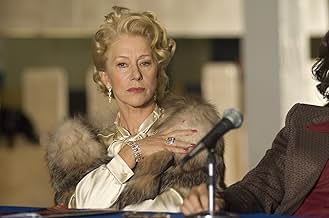IMDb रेटिंग
5.6/10
3.5 हज़ार
आपकी रेटिंग
अपनी भाषा में प्लॉट जोड़ेंA drama revolving around a married couple who opened the first legal brothel in Nevada.A drama revolving around a married couple who opened the first legal brothel in Nevada.A drama revolving around a married couple who opened the first legal brothel in Nevada.
- पुरस्कार
- 1 जीत और कुल 1 नामांकन
Raoul Max Trujillo
- Hernan Prado
- (as Raoul Trujillo)
फ़ीचर्ड समीक्षाएं
It's 1976. Married couple Grace (Helen Mirren) and Charlie Bontempo (Joe Pesci) own the Love Ranch outside of Reno. Irene (Gina Gershon), Mallory (Taryn Manning), Christina (Scout Taylor-Compton), Samantha (Bai Ling), and Alana (Elise Neal) are some of the girls working at the ranch. Charlie is unstable and recruits boxer Armando Bruza to train out on the ranch. His criminal background forces Grace to be Bruza's manager. He controls the local police and faces an effort to criminalize prostitution.
This is a mess of stories. It can't be the actors because there are some great ones here. There is probably too many story elements going on. It's in the writing itself. It should concentrate on Mirren and Pesci. It should also get somebody bigger than Sergio Peris-Mencheta. The movie seems to struggle for an identity. It's a waste of great talents.
This is a mess of stories. It can't be the actors because there are some great ones here. There is probably too many story elements going on. It's in the writing itself. It should concentrate on Mirren and Pesci. It should also get somebody bigger than Sergio Peris-Mencheta. The movie seems to struggle for an identity. It's a waste of great talents.
I sought this movie out on DVD because it's cinema release was negligible, and anything with Helen Mirren will have some merit. I can only imagine it's almost invisible release was due to the inability of the youthful marketeers to easily identify the box in which to place it, romance, thriller, gangster flic? For those of us who don't care about such trite labels, this is an interesting movie, characters with some depth, it's not really about goodies or baddies, or even right or wrong, it's a story, with some romance, some humour, some sex, some drama, great performances from stalwarts and what should have been a launch pad to international stardom for the young Spaniard...fear not Sergio, we will see you again. I liked it a lot and really recommend it to people who enjoy films about other people rather than machines and/or concepts!
8mckn
Picture a caricature of everything that America, at some level, holds dear, yet despises. Think bling, brash, frantically optimistic and determinedly selfish, and you have the main character typecast by a weathered Joe Pesci. Add to the mix an insecure, yet intelligent and reasonably efficient brothel "madam" who is trapped by economics and an irresponsible, hyperactive, and deliberately delusional husband, and. you have a marriage which must resonate across the globe.
The film opens with an ironic and trite hope for the future. Auld Lang Syne is sung at a New Year's Eve party, which Robert Burnes, no stranger to joys of the flesh himself, would possibly have avoided. A stark naked man who has transcended the bounds of good taste, and possibly the law, is driven by the "Madam" (Helen Mirren) into the waiting furniture wielded by her husband, Pesci. The tame police in attendance remove the problem and the party continues.
Gradually the dynamics of the Pesci/Mirren relationship are revealed. She actually likes her charges and comforts herself in the knowledge that she is keeping them off the streets.
He struts around like a dove with an over-inflated breast, a disgustingly showy car with the vanity plate "LUV SEX", and the nickname of "Mr Good Times". He is a man whose very posture suggests violence, and he has only to threaten to smash the home telephone, her link to the outside world, to ensure that her timid attempt at rebellion turns into a whimpering desire to please him.
Pleasing him in the only way he understands is not that easy as she is older than the available nymphets and is very aware that his sudden business calls are not to any office block. The marriage of financial and social convenience could, theoretically, have lasted for years, as many convenient couples will attest, but reality has the unpleasant habit of intruding. A visit to the doctor and plastic convenience is stripped away. The selfishness of her husband is expertly conveyed in his answer to her questioning his love for her. "I *** love you," he says, "I could have never found a woman as loyal as you to take my s***." It says everything that he is totally unaware of the egocentric nature of his declaration of love.
Later, when their world is falling apart, and she is experiencing loss, and almost claustrophobic grief,he rails at her that she doesn't know what the **** he went through all night.
The tragic moment which announces the end of the film is justified by the quality of the acting. Yes, this could happen, and be a small article on the front page of the morning newspapers, but the film has made its point before the actual violence. It is all about self, the need for self-validation at the expense of others, the need to be desirable, the need to be in control, and even the need to be physically dominant while all these have inevitably and irrevocably been taken away by time.
It is a film worthy of a second viewing, if only to enjoy the performance of Pesci (which he has reprized from Goodfellas) and the revelation which is Helen Mirren. That she could go from the ultra- British role as the Queen to this, without a trace of genteel accent, but retain all the pathos of a woman who wants to love her husband and her life, is remarkable. Even the director gives her credit in an in- joke. When her husband dons a hat in keeping with his personality, she asks him who he thinks he is, 'Clint Eastwood'. He replies: "Who do you think you are? The Queen of England?"
Eminently watchable, character-driven, and filmed with an understated slickness, this is a film which might, regrettably, not set the box office alight, but which is very worth viewing for so many reasons. True, there are elements that echo events in some well-known films, which my spoiler-conscience prevents me from naming, but it is safe to say that this film strips the sentimentality from such and is the better for it. Taylor Hackford, I look forward to your next.
The film opens with an ironic and trite hope for the future. Auld Lang Syne is sung at a New Year's Eve party, which Robert Burnes, no stranger to joys of the flesh himself, would possibly have avoided. A stark naked man who has transcended the bounds of good taste, and possibly the law, is driven by the "Madam" (Helen Mirren) into the waiting furniture wielded by her husband, Pesci. The tame police in attendance remove the problem and the party continues.
Gradually the dynamics of the Pesci/Mirren relationship are revealed. She actually likes her charges and comforts herself in the knowledge that she is keeping them off the streets.
He struts around like a dove with an over-inflated breast, a disgustingly showy car with the vanity plate "LUV SEX", and the nickname of "Mr Good Times". He is a man whose very posture suggests violence, and he has only to threaten to smash the home telephone, her link to the outside world, to ensure that her timid attempt at rebellion turns into a whimpering desire to please him.
Pleasing him in the only way he understands is not that easy as she is older than the available nymphets and is very aware that his sudden business calls are not to any office block. The marriage of financial and social convenience could, theoretically, have lasted for years, as many convenient couples will attest, but reality has the unpleasant habit of intruding. A visit to the doctor and plastic convenience is stripped away. The selfishness of her husband is expertly conveyed in his answer to her questioning his love for her. "I *** love you," he says, "I could have never found a woman as loyal as you to take my s***." It says everything that he is totally unaware of the egocentric nature of his declaration of love.
Later, when their world is falling apart, and she is experiencing loss, and almost claustrophobic grief,he rails at her that she doesn't know what the **** he went through all night.
The tragic moment which announces the end of the film is justified by the quality of the acting. Yes, this could happen, and be a small article on the front page of the morning newspapers, but the film has made its point before the actual violence. It is all about self, the need for self-validation at the expense of others, the need to be desirable, the need to be in control, and even the need to be physically dominant while all these have inevitably and irrevocably been taken away by time.
It is a film worthy of a second viewing, if only to enjoy the performance of Pesci (which he has reprized from Goodfellas) and the revelation which is Helen Mirren. That she could go from the ultra- British role as the Queen to this, without a trace of genteel accent, but retain all the pathos of a woman who wants to love her husband and her life, is remarkable. Even the director gives her credit in an in- joke. When her husband dons a hat in keeping with his personality, she asks him who he thinks he is, 'Clint Eastwood'. He replies: "Who do you think you are? The Queen of England?"
Eminently watchable, character-driven, and filmed with an understated slickness, this is a film which might, regrettably, not set the box office alight, but which is very worth viewing for so many reasons. True, there are elements that echo events in some well-known films, which my spoiler-conscience prevents me from naming, but it is safe to say that this film strips the sentimentality from such and is the better for it. Taylor Hackford, I look forward to your next.
The thing that stands out immediately in "Love Ranch" is not the girls, not the 1970s clothes, but the amazing photography. Almost every outdoor scene could be the vista for a postcard. The story itself seems to drag in places, and then suddenly rush to a conclusion, with narration to tidy up the ending. The acting by Helen Mirren and Joe Pesci is terrific as expected, and a small scene with Harve Presnell a pleasant surprise. What is not a surprise is the tale of the Mustang Ranch on which the movie is based. It's tough to overcome the familiarity of a story often aired on cable over the last two decades. - MERK
Love Ranch fooled me but good. For some reason, I was picturing a raucous, raunchy comedy about a legal brothel run by Joe Pesci and Helen Mirren. But it's not really that way at all; no, this is a standard-issue melodrama about an abusive misogynist who runs his part of the world, his steely wife who runs the business side of the things, and the hapless pro boxer who gets mixed up with them. It's not funny because it's not supposed to be, and that's kind of sad; there's potential for laughs, but in the end all you get are clichés and bad character choices.
Charlie (Pesci) and Grace (Mirren) Bontempo open up the first legal brothel in Nevada. She's the daughter of a prostitute, he's done a stretch in San Quentin. It's the 1970s. They have a pretty good setup for themselves; good-looking women, steady clients, and the law on their side (and in their pockets). They don't want for much, seemingly. Then Charlie, a hotheaded tempest in a teacup if ever there was one, gets the idea that they'll garner more respect (or, more accurately, he will) if they own a successful professional boxer. So he buys the contract of one Armando Bruza, an up-and-coming Argentinian, much to Grace's chagrin. Charlie's banking on his guy doing well in his next fight, based on the rumor that Muhammed Ali would take on the winner.
Here, Pesci plays a slightly watered-down version of Tommy DeVito from Goodfellas. He's foul mouthed, ill tempered, not very bright about a great many things, and seems to survive on chutzpah and the good grace of, well, Grace. Naturally, being the proprietor of a brothel has its privileges, and Charlie samples the wares with some regularity, an occurrence that Grace idly tolerates. When she's asked to become Bruza's manager - as a felon, Charlie can't get a license - she's reluctant, but the swarthy boxer has other ideas. And so it goes.
Now, there's nothing inherently wrong with predictability. If I expect A to happen, and A happens, that's okay - as long as A wasn't spelled out as a fait accompli. If I expect A to happen, but B happens, that is also okay - as long as B is plausible. Here, I expect A to happen, and A happens, and it's obvious from almost the start of the movie that A will happen. This extends to character development as well. If a character does something, say, out of character (!), that's fine - as long as it propels the plot AND makes some bit of sense. Otherwise, it's just a ploy to get me to keep watching. In this movie, Charlie's character is so one-dimensional that when he makes an attempt to be lovey-dovey with Grace it's not even remotely believable. I can blame Pesci a little for this, but it just seem as if he had much to work with.
And for a movie that uses a brothel as its main background, there's very little naughty stuff going on; they may as well have set it in a video store, if those still existed. There's a side plot about some high-and-mighty moral compass waging a war against the legal brothel, but it's barely touched upon, pardon the pun. (The other puns are unpardonable.) The plot just bounces around from issue to issue, circling the main story threat of Bruza, Grace, and Charlie. The result is sometimes maudlin and hackneyed and other terms writers use to describe crappy writing.
Charlie (Pesci) and Grace (Mirren) Bontempo open up the first legal brothel in Nevada. She's the daughter of a prostitute, he's done a stretch in San Quentin. It's the 1970s. They have a pretty good setup for themselves; good-looking women, steady clients, and the law on their side (and in their pockets). They don't want for much, seemingly. Then Charlie, a hotheaded tempest in a teacup if ever there was one, gets the idea that they'll garner more respect (or, more accurately, he will) if they own a successful professional boxer. So he buys the contract of one Armando Bruza, an up-and-coming Argentinian, much to Grace's chagrin. Charlie's banking on his guy doing well in his next fight, based on the rumor that Muhammed Ali would take on the winner.
Here, Pesci plays a slightly watered-down version of Tommy DeVito from Goodfellas. He's foul mouthed, ill tempered, not very bright about a great many things, and seems to survive on chutzpah and the good grace of, well, Grace. Naturally, being the proprietor of a brothel has its privileges, and Charlie samples the wares with some regularity, an occurrence that Grace idly tolerates. When she's asked to become Bruza's manager - as a felon, Charlie can't get a license - she's reluctant, but the swarthy boxer has other ideas. And so it goes.
Now, there's nothing inherently wrong with predictability. If I expect A to happen, and A happens, that's okay - as long as A wasn't spelled out as a fait accompli. If I expect A to happen, but B happens, that is also okay - as long as B is plausible. Here, I expect A to happen, and A happens, and it's obvious from almost the start of the movie that A will happen. This extends to character development as well. If a character does something, say, out of character (!), that's fine - as long as it propels the plot AND makes some bit of sense. Otherwise, it's just a ploy to get me to keep watching. In this movie, Charlie's character is so one-dimensional that when he makes an attempt to be lovey-dovey with Grace it's not even remotely believable. I can blame Pesci a little for this, but it just seem as if he had much to work with.
And for a movie that uses a brothel as its main background, there's very little naughty stuff going on; they may as well have set it in a video store, if those still existed. There's a side plot about some high-and-mighty moral compass waging a war against the legal brothel, but it's barely touched upon, pardon the pun. (The other puns are unpardonable.) The plot just bounces around from issue to issue, circling the main story threat of Bruza, Grace, and Charlie. The result is sometimes maudlin and hackneyed and other terms writers use to describe crappy writing.
क्या आपको पता है
- ट्रिवियाBased at least roughly on 1976 events involving the Mustang Ranch in Sparks, Nevada, and Argentine former heavyweight Oscar "Ringo" Bonavena.
- गूफ़At the beginning of the film, Charlie and the band are performing to a packed house. The drummer uses a crash cymbal from the very popular Zildjian company, the A Custom. This movie takes place in 1976, and the Zildjian A Custom didn't come out until 1990.
- भाव
[first lines]
Grace Bontempo: Selling love will make you rich. That's what my mother taught me. Just don't put your heart in it.
- साउंडट्रैकI Just Want to Make Love to You
Written by Willie Dixon
Performed by Foghat
Courtesy of Bearsville Records/Rhino Entertainment Company
By arrangement with Warner Music Group Film & TV Licensing and by arrangement with Victor Entertainment, Inc. for Japan
टॉप पसंद
रेटिंग देने के लिए साइन-इन करें और वैयक्तिकृत सुझावों के लिए वॉचलिस्ट करें
- How long is Love Ranch?Alexa द्वारा संचालित
- Is "Love Ranch" based on a book?
- When was prostitution made legal in Nevada?
- In what year does the movie take place?
विवरण
- रिलीज़ की तारीख़
- कंट्री ऑफ़ ओरिजिन
- आधिकारिक साइट
- भाषा
- इस रूप में भी जाना जाता है
- Ljubezenski ranc
- फ़िल्माने की जगहें
- उत्पादन कंपनियां
- IMDbPro पर और कंपनी क्रेडिट देखें
बॉक्स ऑफ़िस
- बजट
- $2,50,00,000(अनुमानित)
- US और कनाडा में सकल
- $1,37,885
- US और कनाडा में पहले सप्ताह में कुल कमाई
- $44,220
- 4 जुल॰ 2010
- दुनिया भर में सकल
- $1,46,149
- चलने की अवधि1 घंटा 57 मिनट
- रंग
- ध्वनि मिश्रण
- पक्ष अनुपात
- 1.85 : 1
इस पेज में योगदान दें
किसी बदलाव का सुझाव दें या अनुपलब्ध कॉन्टेंट जोड़ें







































